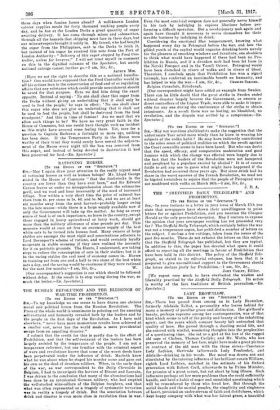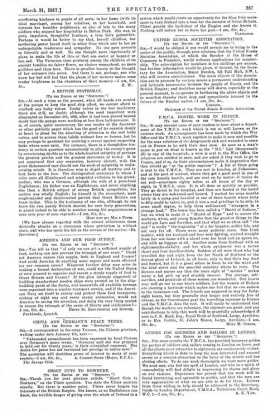LADY BROWNLOW.
(To THE EDITOR OF THE " SPECTATOR.") SIR,—There has passed from among us in Lady Brownlow, formerly Adelaide Talbot, a personality who leaves behind for many a memory of peculiar grace and distinction. Her girlhood's beauty, perhaps supreme among her contemporaries, was of that kind which seems to tell of the purity and beauty of the inhabiting spirit; and the years which conquer beauty left untouched that quality of hers. She passed through a dazzling social life, and she entered with wistful, wondering thoughts into the perplexities of a questioning time. She sat as a girl at the feet of the rugged old sage of Chelsea, Thomas Carlyle; and Mr. Watts, who has preserved the memory of "her face, might have made a great picture in contrast of the old man with the three sisters—Constance Lady Lothian, Gertrude (afterwards Lady Pembroke), and Adelaide—drinking in his words. Her mind was drawn out and stimulated by the tutoring influence of her brilliant cousin William, eighth Lord Lothian, matched in the estimate of his Oxford generation with Robert Cecil, afterwards to be Prime Minister, for promise of a great career, but cut short by long illness. Such influences perhaps set her more problems than she could sufficiently handle, and bred a habit of eager and unsatisfied questioning which will be remembered by those who loved her. But through the social dazzle and the mantel puzzles, the simplicity and singleness of heart, persisted an under-stream of faith and dutifulness, which .kent happy company with 'what was her fairest grace, a beautiful
overflowing, kindness to people of all sorts, in her home (with its ideal marriage), among her relatives, in her household, and towards her humbler neighbours, as also of late to the many soldiers who enjoyed her hospitality in Belton Park. She was, in pure, impulsive, thoughtful kindness, a true fairy godmother. Perhaps it would be better to say that, herself childless, her mothering power found itself in other lives which owe to her an nnforgettable tenderness and sympathy. No one gave presents so liberally and so well. No one thought more impetuously of plans to make the life of this or that one easier or happier or less sad. The Victorian time produced among the children of its ancient families no fairer flower, no choicer womanhood, no more guileless soul than hers. There is peculiar beauty in the thought of her entrance into peace. And there is not, perhaps, one Rho knew her but will feel that the gleam of her memory makes some tender brightness in the chambers of their memory.—I am, Sir,



























 Previous page
Previous page